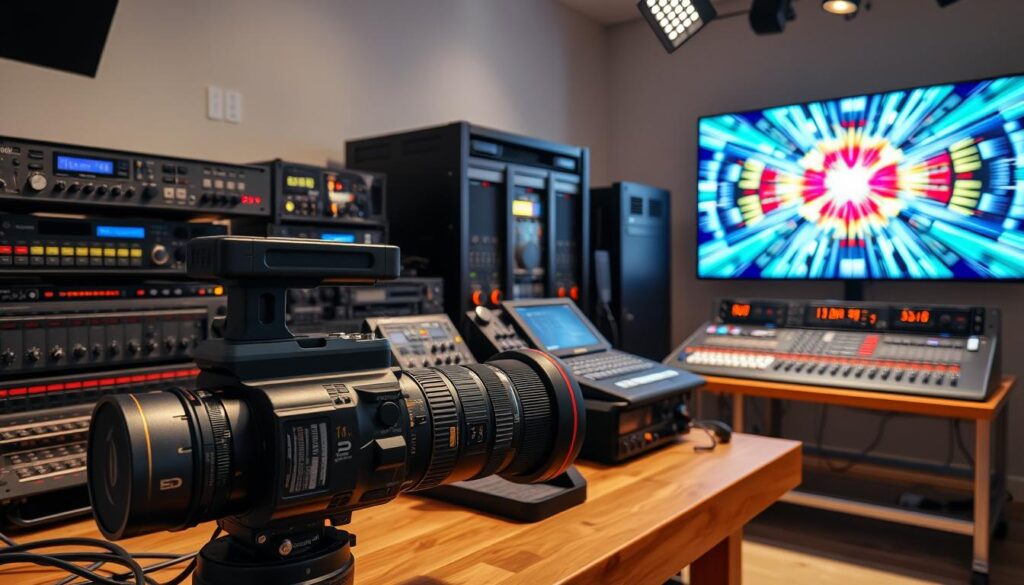Did you know 2,500 broadcast technician positions open annually despite zero projected industry growth? This surprising reality means replacements—not new roles—will drive hiring through 2033. To secure one of these coveted technical positions, you’ll need more than basic equipment knowledge. The field demands specialized certifications, AI-optimized resumes, and mastery of emerging broadcast technologies.
Today’s applicants face a unique challenge: standing out in a static job market where 64% of roles require a bachelor’s and 20% demand associate degrees. With median salaries reaching $53,920 and top earners clearing $115,400, the stakes are high. Your success hinges on strategic skill development and tools like RoboApply, which helps candidates create ATS-friendly resumes tailored to broadcast engineering roles.
This guide cuts through the noise with actionable steps for navigating technical interviews, building portfolios, and understanding RF systems. You’ll learn how to highlight troubleshooting expertise (a key 11% skill gap) and leverage automation systems—the fifth most sought-after competency. We’ll also show you how to adapt proven strategies from medical imaging resume templates to showcase your technical proficiencies.
Key Takeaways
- Annual job openings rely heavily on retirements, not industry expansion
- 63% of roles require post-secondary education in broadcast technology
- Top earners make 4x entry-level salaries through specialized certifications
- AI tools optimize resumes for automated hiring systems
- Troubleshooting skills remain critical across all experience levels
Introduction: How to Land a Broadcast Technician Job in 2025
Securing a position as a broadcast technician demands strategic planning. With 30,000 active roles and 2,500 annual openings from retirements, you’ll compete in a stable yet replacement-driven market. Entry requirements vary: 63% of positions prefer associate degrees, while 37% accept high school diplomas with hands-on experience.
- Master both analog equipment and IP-based systems
- Showcase troubleshooting skills in live production scenarios
- Use AI-powered tools to match resumes with technical job descriptions
Employers increasingly value hybrid skill sets. One hiring manager notes: “Candidates who understand cloud broadcasting workflows get 40% faster callbacks.” Pair certifications like Certified Broadcast Networking Engineer (CBNE) with soft skills like crisis management.
RoboApply’s resume builder automatically formats technical competencies using ATS-friendly language, while its Chrome extension tracks application statuses across platforms. This approach helps technicians stand out in markets where 82% of roles receive 50+ applications weekly.
“Broadcast techs must evolve with 5G and AI integration—adaptability isn’t optional.”
Understanding the Role of a Broadcast Technician
Modern media operations rely on skilled professionals who blend technical expertise with real-time problem-solving. Your daily workflow will balance equipment management with creative collaboration across multiple platforms.

Day-to-Day Responsibilities
You’ll manage signal flow like a traffic controller during rush hour. Typical tasks include:
- Calibrating audio consoles for live television broadcasts
- Troubleshooting video switchers during breaking news coverage
- Testing satellite uplinks before radio program transmissions
Equipment maintenance consumes 30% of your week. One production manager notes: “Technicians who preemptively replace aging cables reduce downtime by 40%.” Use checklists from established career guides to streamline your maintenance routines.
Work Environment and Conditions
Climate-controlled studios become your second home. Prepare for:
- Irregular shifts covering early mornings or late-night music shows
- Rapid equipment swaps during commercial breaks
- Collaborative problem-solving with directors via headsets
87% of technicians report handling at least three equipment types daily. Those with stage production experience adapt faster to lighting boards and digital mixers. Remember: Your calm response to signal drops during live events determines program quality.
Essential Education and Training Requirements
Your path to technical roles begins with targeted learning. While 63% of positions require post-secondary education, alternative routes exist for hands-on learners. The right combination of formal training and practical exposure positions you for success in this competitive field.
Technical Certifications and Degrees
Start with an associate’s degree in communications technology or related fields. Programs like Radio & Television Broadcasting Technology teach signal processing and equipment maintenance. Key courses cover electronics, computer networks, and media production workflows.
Supplement your degree with vendor-specific certifications. Audio Engineering Society credentials demonstrate proficiency in live sound mixing. Manufacturers like Ross Video offer training for their production switchers – skills stations value during equipment upgrades.
Apprenticeship and Local Training Opportunities
Earn while learning through structured apprenticeships. Local unions and broadcast facilities often sponsor 2-year programs combining classroom instruction with equipment troubleshooting. One field engineer apprentice shared: “I mastered satellite uplink repairs while completing my certification modules.”
Community colleges provide affordable pathways with evening classes. Many partner with regional stations for internship placements. For those transitioning from network engineering roles, accelerated programs bridge skill gaps in RF systems and broadcast automation.
Key Skills for Broadcast Technicians
Technical mastery meets rapid decision-making in modern broadcasting roles. Employers seek candidates who balance equipment expertise with soft skills that keep productions running smoothly.

Critical Technical and Communication Skills
Sharp problem detection separates competent workers from exceptional ones. Practice identifying audio distortions through headphones while simultaneously adjusting mixer levels – this dual focus becomes second nature during live events.
Develop a systematic approach to equipment checks. Successful technicians document every signal fluctuation using tools like research skills frameworks. One production engineer notes: “My maintenance logs reduced equipment failures by 62% last quarter.”
- Visual acuity: Spot pixelation issues on monitors before they air
- Verbal precision: Relay technical updates to non-technical teams clearly
- Preventive maintenance: Replace aging cables during scheduled downtime
Master equipment diagnostics through manufacturer webinars. Many companies offer free certification courses for their latest broadcast tools. Pair this technical growth with crisis communication drills – roleplay explaining a transmitter failure to nervous producers.
Adaptability proves crucial when switching between solo setup tasks and collaborative troubleshooting. Keep a skills journal tracking your response times to common problems. This practice helps identify areas for improvement while demonstrating professional development during interviews.
Building a Standout Resume for a Broadcast Technician Job
Crafting a winning resume requires precision and strategic detail placement. Focus on technical specifications that hiring managers scan for during 7-second initial reviews. List specific equipment like Ross Carbonite switchers or SSL Live consoles to demonstrate hands-on expertise.
Highlighting Relevant Experience and Projects
Quantify achievements using industry-specific metrics. Instead of “maintained equipment,” write: “Optimized 12-channel audio routing for 150+ live sports broadcasts.” Include certifications like Certified Broadcast Technologist above education sections to grab attention faster.
- Prioritize equipment mastery: List transmitters, editing software, and IP-based systems
- Feature troubleshooting wins: “Resolved 30+ signal latency issues during election coverage”
- Show career progression: Start with recent role showcasing advanced responsibilities
Education sections should mirror job requirements. If an associate’s degree appears in 63% of postings, position it below certifications but above unrelated work history. One hiring manager notes: “Candidates who match our equipment list get 50% more interviews.”
Use RoboApply’s resume builder to auto-format technical jargon into ATS-friendly language. Its AI scans job descriptions to highlight your most relevant RF system upgrades or live production support hours. The Chrome extension tracks applications across platforms, ensuring you never miss a callback.
Leveraging RoboApply: AI Resume and Cover Letter Builder
Modern job seekers need smarter tools to navigate competitive markets. RoboApply’s AI-powered platform streamlines every step of your application process, from resume formatting to interview prep.

Optimizing ATS Performance
Broadcast stations use applicant tracking systems to filter 72% of resumes before human review. RoboApply’s builder analyzes job descriptions to prioritize keywords like “RF systems maintenance” or “live broadcast support.” One hiring manager confirms: “Candidates using ATS-optimized resumes see 35% more interview requests.”
- Auto-format technical certifications for quick scanning
- Match equipment lists from job postings
- Highlight troubleshooting metrics employers value
Grammar Checks and Auto-Apply Efficiency
The Chrome extension lets you apply to 15+ roles hourly while maintaining customization. Key features include:
- Real-time error detection for technical terminology
- One-click applications with personalized cover letters
- Progress tracking across multiple job boards
For those exploring remote tech roles, the tool adapts resumes to highlight remote collaboration skills. The interview coach provides practice scenarios specific to broadcast engineering challenges, like explaining signal chain diagrams under time pressure.
“RoboApply users cut application time by 60% while increasing callback rates.”
Tips for Acquiring Hands-On Experience
Practical skills separate aspiring technicians from qualified candidates. Start building your technical foundation through immersive learning opportunities that mirror real production environments.
Internships and Volunteer Opportunities
Local radio stations offer crash courses in equipment operations. Spend three months interning at community TV networks to master signal routing during live events. Volunteer coordinators at music festivals often need help managing stage audio systems.
Nonprofit organizations provide unexpected training grounds. Assist with livestream setups for charity auctions or school board meetings. These projects let you troubleshoot encoder configurations while expanding professional contacts.
Hands-On Workshops and Training Sessions
Manufacturer-led programs deliver cutting-edge practice. Attend Sony’s camera workshop or Avid’s mixing console clinics to learn industry-standard workflows. Many colleges host weekend sessions on IP-based broadcast systems.
Shadow experienced technicians during equipment upgrades at regional stations. Some facilities offer “ride-along” programs where you assist with remote broadcasts for sports events. This exposure helps you understand workflow pressures while demonstrating initiative.
FAQ
What education is required for broadcast technician roles?
Most positions require an associate degree in broadcast technology or electronics. Certifications like Certified Broadcast Technologist (CBT) boost competitiveness. Some employers accept equivalent military training or apprenticeships with hands-on equipment experience.
Which technical skills matter most for audio video technicians?
Mastery of signal flow management, live sound mixing, and troubleshooting electronic equipment problems is critical. Proficiency with broadcast software (e.g., Adobe Audition) and hardware like routers/transmitters is equally vital. Employers prioritize candidates who adapt quickly to new broadcast engineer tools.
How does RoboApply improve job application success?
RoboApply’s AI resume builder optimizes keywords for ATS systems, while its grammar checker ensures error-free documents. The auto-apply Chrome extension streamlines submitting applications across platforms like LinkedIn and Indeed, saving 10+ hours weekly.
What hands-on opportunities help beginners gain experience?
Seek internships at local TV/radio stations or volunteer for live events needing sound engineering technicians. Community colleges often host workshops teaching lighting setups and equipment repairs – perfect for building demonstrable skills.
Are broadcast technician jobs growing in 2025?
The Bureau of Labor Statistics projects 3% growth for broadcast and sound engineering technicians through 2033. Demand remains steady for professionals skilled in streaming tech and hybrid event production systems.
How do I showcase projects on a broadcast technician resume?
Highlight specific achievements like “Optimized audio clarity for 50+ live sports broadcasts using Dante AoIP systems” or “Reduced equipment downtime 40% through preventive maintenance schedules.” Use metrics to demonstrate technical impact.


















